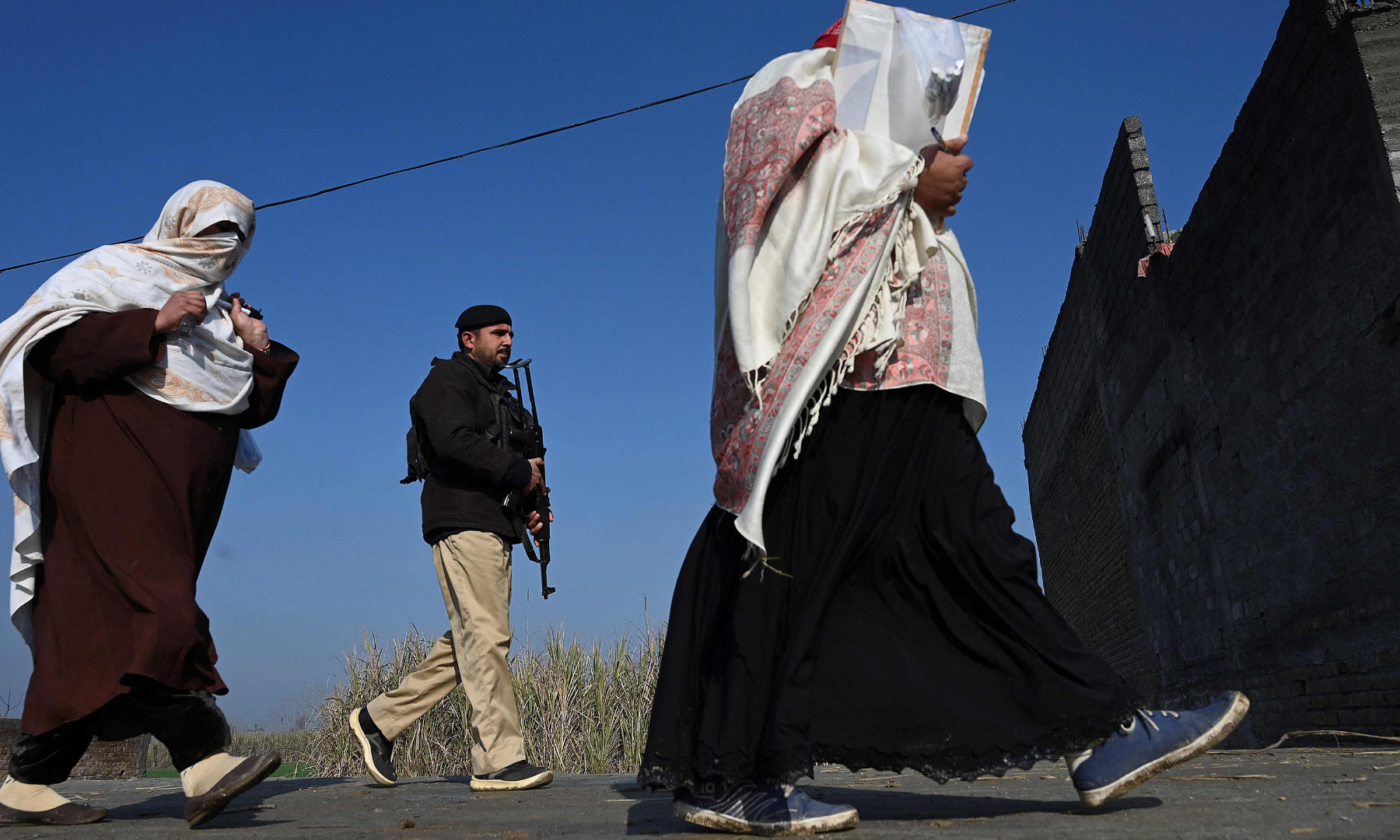Bathed in crisp morning light, Sidra Hussain grips a cooler stacked with glistening vials of polio vaccine in Khyber Pakhtunkhwa.
Watching over Hussain and her partner, a policeman unslings his rifle and eyes the horizon.
In concert they begin their task — going door-to-door on the outskirts of Mardan, dripping bitter doses of rose-coloured medicine into infants' mouths on the eve of a major milestone for the nation's anti-polio drive.

The last infection of the wild poliovirus was recorded on January 27, 2021, according to officials, and Friday marks the first time in Pakistan's history that a year has passed with no new cases.
To formally eradicate the disease, a nation must be polio-free for three consecutive years — but even 12 months is a long time in a country where vaccination teams are in the crosshairs of a simmering insurgency.
Since the Taliban takeover of neighbouring Afghanistan, the Tehreek-i-Taliban Pakistan (TTP) has become emboldened and its terrorists frequently target polio teams.
“Life or death is in God's hands,” Hussain told AFP this week, amid a patchwork of high-walled compounds in KP.
“We have to come,” she said defiantly. “We can't just turn back because it's difficult.”

Thriving in uncertainty
Nigeria officially eradicated wild polio in 2020, leaving Pakistan and Afghanistan as the only countries where the disease — which causes crippling paralysis — is still endemic.
Spread through faeces and saliva, the virus has historically thrived in the two neighbouring countries.
In 2014 the TTP was largely ousted and forced to retreat to Afghanistan but last year overall militant attacks surged by 56 per cent according to the Pakistan Institute for Conflict and Security Studies, reversing a six-year downward trend.
The largest number of assaults came in August, coinciding with the Afghan Taliban's takeover of Kabul.

Stories of police martyred as they guard polio teams common, and just this week a constable was gunned down in Kohat — 80 kilometres southwest of Mardan.
According to media reports, as many as 70 polio workers have been killed in terrorist attacks since 2012 — mostly in Khyber Pakhtunkhwa.

Mardan deputy commissioner Habib Ullah Arif admits polio teams are “a very soft target”, but says the fight to eradicate the disease is entwined with the security threat.
“There is only one concept: we are going to defeat polio, we are going to defeat militancy,” he pledged.
Vaccine scepticism
Anti-polio drives have been running since 1994, with up to 260,000 vaccinators staging regular waves of regional inoculation campaigns.
But on the fringes of the country, the teams often face scepticism.

“In certain areas of Pakistan, it was considered as a Western conspiracy,” explained Shahzad Baig — head of the national polio eradication programme.
The theories ranged wildly: polio teams are spies, the vaccines cause infertility, or contain pig fat forbidden by Islam.
The spy theory gained currency with the killing of Osama bin Laden in 2011, whose hideaway in Abbottabad was revealed to the United States — unwittingly or otherwise — by a vaccine programme run by a doctor.
Read: Story of the drop — what's inside a polio vaccine that prevents up to 3 million deaths every year
“It's a complex situation,” said Baig. “It's socio-economical, it's political.”
The porous border with Afghanistan — a strategic crutch for the TTP — can also keep polio circulating.
“For the virus, Pakistan and Afghanistan were one country,” said Baig.

In Mardan, 10 teams — each comprising two women and an armed police guard — fan out across the city's suburbs as morning turns to afternoon.
The teams chalk dates on the homes they visit and smear children's fingers with indelible ink to mark those already inoculated.
On Monday they delivered dozens more doses to add to the nationwide tally.
“We have the fear in mind, but we have to be active to serve our nation,” said polio worker Zeb-un-Nissa.
“We have to eradicate this disease.“














































